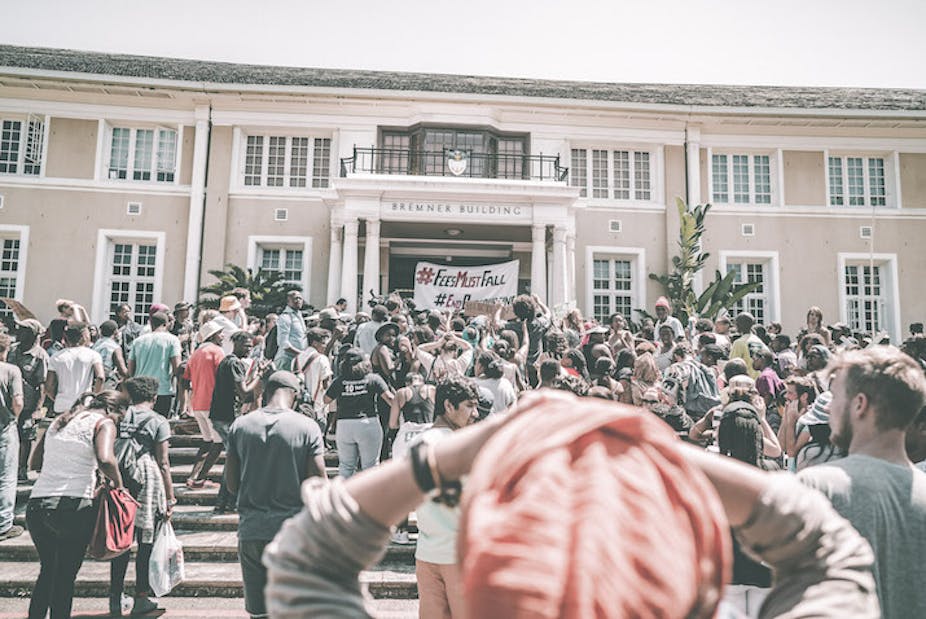It’s no surprise that student movements are shutting down university campuses all over South Africa. More than two decades have passed since the advent of democracy and change in higher education appears to be stuttering.
Students and many academics are fed up with high fees, a teaching body that remains stubbornly white and male, and a curriculum that needs more relevance in an African country.
But I think it is a mistake to reduce this to a single story. This student movement is not just a call for change at institutional level. It is a reaction to the failure of the human capital model of education. We must look at how demands for free education and more black professors are part of a larger critique of crass capitalism in society.
South Africa’s national conversations are increasingly dominated by economic growth discourses – at the expense of policies and actions that are pro-poor. The language of the free market has become the norm in public fora. The state’s main function seems to be lubricating the way for big business in the vain hope that this will eventually lead to improved lives for the masses through the laughable notion of trickle-down economics.
It’s important not to neglect the potential that higher education institutions have to fight back against these forces.
There are many ways in which university structures can challenge the value systems of big business and the state. To do so, academia must say “no” to many processes that are fast becoming ubiquitous in our institutions. Here are five of these processes – and an exploration of how universities can reject them.
Outsourcing
It makes no financial sense for universities to run their own gardening, catering, maintenance and security divisions. Many universities globally and in South Africa have outsourced these functions.
But it makes enormous moral and educational sense not to outsource. Scholars do not attain their understanding of the discipline of history or physics simply through access to the great minds of their professors and textbooks. Their educational progress is made possible, at least in part, by the people who prepare their meals, clean the floors and mow the lawns.
If we truly believe that universities have a responsibility to develop critical citizens, then they have a concomitant responsibility to instil gratitude for those who make it possible and empathy with all lives around them. Universities must model what collegial, caring, decent employment looks like: it is the antithesis of the business model of outsourced “peripheral tasks” that’s taken hold at South Africa’s institutions.
Performance management
Following international trends, performance management has been implemented with a vengeance at many universities. If it can’t be listed on an Excel spreadsheet and contribute to a Key Performance Area, it didn’t happen. The notion that everything can and should be counted undermines the academic project in multiple ways.
But, not having a numeric measure of targets and achievements should not be the way in which academics who neither teach with commitment nor produce research avoid censure.
We need to have accountability and transparency – but we also need to have the nuanced understanding that the university is a complex system. Even within the academic staff there is, and needs to be, a wide array of focus areas and realms of expertise.
Research backhanders
Most South African universities reward researchers financially for their output. This could be money paid into a research account or, at some universities, part of one’s salary.
But research is fundamental to the university’s endeavour of contributing to knowledge, solving social ills and providing quality teaching. To give rewards for research and ignore other academic responsibilities like teaching and community engagement reinforces the hierarchy of academic work.
It leads to numerous unintended consequences, such as a perverse incentive for individualistic, un-collegial behaviour. Why mentor a junior colleague through co-publication when that would mean halving the money with her?
Executive deans
Academic management must change regularly and needs to strongly represent the voice and needs of a faculty’s staff and students. For deans to genuinely reflect the interests of these constituents they need to be active members in touch with the realities of the academy. They should be producing research and guiding postgraduate scholars. They should be invested in returning to these academic roles after their term of office.
This assumes that senior academics will be willing to put up their hands and take on these roles, secure in the knowledge that their colleagues support and trust them.
Most universities in South Africa now hire executive deans, paying huge salaries to people who may bring an expertise in business management but have little knowledge about research production or concern for the transformation agenda.
Rankings
One major thrust in the “university as business” models is the ranking of universities in a competitive list. We are no longer a public sector working together to achieve a public good by contributing to knowledge and preparing skilled critical citizens.
Instead, we are a set of businesses trying to maximise our brand value.
Universities should be focused on how we function together as a sector rather than spending their energy on improving rankings.
A battle ahead
The university where I work has been able to hold out on all of these issues.
Perhaps this is because of its small size, or because both its previous and current vice-chancellors have been compassionate leaders who put people and the intellectual project above all else. But we should not rest on our laurels and assume it will retain these characteristics.
The university is just one small social structure. That doesn’t mean it has to replicate the injustices of broader society. As a sector, we must work together now as never before to resist the dangerous construction of higher education as big business.

